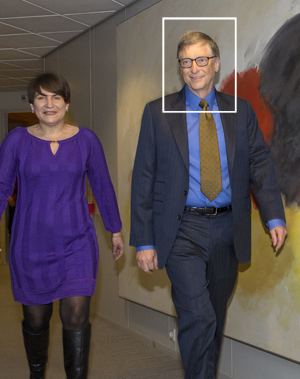
Your complimentary articles
You’ve read one of your four complimentary articles for this month.
You can read four articles free per month. To have complete access to the thousands of philosophy articles on this site, please
News
News: August/September 2022
Face-off at Microsoft • Museum argues over ethics of sponsorship • Philosophers meet by candlelight — News reports by Anja Steinbauer
Ethics of Facial Recognition AI

FACE ID >> POSSIBLE MATCH?? >>GATES, B. <<
Photo © Foreign Ministry Of The Netherlands
Microsoft have decided that – for now – they will no longer offer facial recognition tools that can determine age, gender or emotional expression. In their announcement they acknowledged that “The potential of AI systems to exacerbate societal biases and inequities is one of the most widely recognized harms associated with these systems”, the tech giant promises to keep “people and their goals at the center of system design decisions and respecting enduring values like fairness, reliability and safety, privacy and security, inclusiveness, transparency, and accountability.” Academics and activists have long pointed to the moral challenges of facial recognition, which they perceive to threaten fundamental rights, especially where it is used for surveillance purposes. In a 27 page document, the result of a two year research project conducted by a team of experts, Microsoft expounds a framework of rules that the company is setting for itself with respect to the development and use of facial recognition. This step is no doubt also driven by the high error rate of facial recognition systems when it comes to some ethnic groups, to gender and to identifying emotional expression. Mistakes to do with facial recognition can have extremely damaging consequences, especially in a police context. One example is the case of Nijeer Parks, who was charged with aggravated assault, unlawful possession of weapons, using a fake ID, possession of marijuana, shoplifting, leaving the scene of a crime, resisting arrest and hitting a police officer with a car. He was arrested on the strength of a ‘high profile comparison’ from a facial recognition scan of a photo from what turned out to be a fake ID left at the crime scene. He spent 11 days in prison and was fined $5000, although he had been 50 km away from the crime scene at the time.
Teachers Boycott Science Museum in Greenwash Protest

Science Museum preparing to answer its critics
Photo © Science Museum, London. Creative Commons
The Science Museum in London has had trouble recently over sponsorship deals. Last October, a former director of the museum, climate scientist Prof Chris Rapley, resigned from its advisory board in opposition to the museum accepting oil and gas company sponsorship. Now, more than 400 educators have signed an open letter to the museum pressing it to cancel its sponsorship deal with a company linked to the coalmining corporation Adani. Adani Green Energy will sponsor the museum’s Energy Revolution gallery, due to open next year. The letter threatens a widespread boycott over the deal with Adani Green Energy, whose parent company, Adani Group, is a large scale operator of coalmines and coal-fired power stations. The letter reads “As educators, we have a legal duty to ensure our students are receiving a fair and balanced education, which prepares them properly for their future. There is no doubt among the scientific community that in order for us to turn the tide on catastrophic warming, we have to leave fossil fuels in the ground and end the exploration for high carbon energy. The business interests and practices of your major fossil fuel sponsors go directly against this.” The museum’s director, Ian Blatchford, said: “We agree that climate change is the most urgent challenge facing humanity but we don’t agree with the argument from some who say we should sever ties with all energy companies with an association, direct or indirect, with fossil fuels. We believe the right approach is to engage and challenge companies and other partners to do more to make the global economy less carbon intensive.” Forty prominent individuals, including a former chair of the Intergovernmental Panel on Climate Change as well as many leading scientists, who have worked closely with the museum in the past, said they were deeply concerned about its fossil fuel sponsorship deals and that they were withdrawing their support for the museum until a moratorium was announced.
Richard Bernstein Has Died
Academic philosopher and public intellectual Richard J. Bernstein stood out for battling to overcome the entrenched divide between ‘continental’ and ‘analytical’ philosophy. Partly to this end, he entered into dialogues with prominent thinkers such as Hannah Arendt, Jürgen Habermas, Hans-Georg Gadamer, Jacques Derrida, Richard Rorty, Agnes Heller, and Charles Taylor. He wrote: “It is agreeable to imagine a future in which the tiresome ‘analytic–Continental split’ is looked back upon as an unfortunate, temporary breakdown of communication – a future in which Sellars and Habermas, Davidson and Gadamer, Putnam and Derrida, Rawls and Foucault, are seen as fellow-travelers on the same journey, fellow-citizens of what Michael Oakeshott called a civitas pelegrina.” In his 1975 book Praxis and Action, Bernstein gave a clear and insightful overview of pragmatist, Marxist, existentialist and analytical positions on these two concepts. In The Restructuring of Social and Political Theory (1976) he questioned the choice of the social sciences to increasingly model their approach on the natural sciences. A lifelong critical pragmatist, Bernstein had an illustrious academic career, teaching philosophy at Yale, Haverford College and The New School for Social Research in New York. In 1989 Bernstein was elected President of the Eastern Division of the American Philosophical Association. Bernstein died on 4 July 2022 at the age of 90.
Midnight Philosophy
A Philosophy Now online initiative to combat the isolation of thinkers during the Covid-19 Pandemic has become so well established that it looks set to continue even now that face-to face philosophy gatherings have resumed. When Anja Steinbauer started Midnight Philosophy in June 2020, lockdowns were in force all over the world. For one hour fortnightly on Thursdays, at midnight London time, thinkers from all over the world started getting together on Zoom to consider issues from everyday life, from “food” to”prejudice”, “love” to “boredom” from a philosophical point of view. The meetings continue to thrive, with regular and new participants from Europe, the USA, Australia, Jordan, Malaysia, South Africa, Canada and more. It’s free and anyone interested in ideas and constructive discussions is welcome to join. You can find full details in advance of each meeting on the Philosophy Now London Meetup page at https://www.meetup.com/London-Philosophy-Now-Meetup-Group/. R.L.









